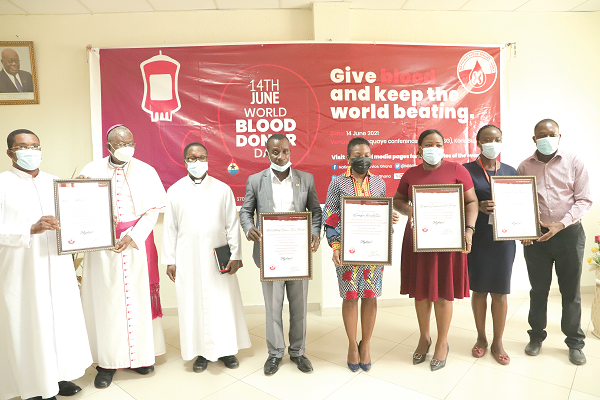
World Blood Donors Day: National Blood Service attains agency status
The Minister of Health, Mr Kwaku Agyeman-Manu, has said the National Blood Service (NBS) has attained an agency status under the Ministry of Health (MoH).
“The ministry was able to secure the needed legal backing for the NBS to attain agency status and this has subsequently resulted in the passage of the NBS Bill by Parliament,” he said, adding that the service could now sue or be sued.
This was contained in an address read on behalf of the minister by the Technical Coordinating Director of the MoH, Dr Martha Gyansa-Lutterodt, at this year’s World Blood Donors Day in Accra yesterday.
Event
The day is commemorated on June 14 annually to raise awareness of the value of safe blood in saving lives and also thank voluntary unpaid blood donors for their contribution to saving the lives of patients.
It is also to draw the attention of the public to the need for donating blood voluntarily to help save others in critical times.
It was on the theme: “Give blood and keep the world beating”.
The Graphic Communications Group Limited and four other institutions were honoured for their support in educating the public on the need to donate blood to save lives.
The minister acknowledged the support of all donors and said the focus of this year’s celebration was on young people.
“In many countries, young people have been at the forefront of activities and initiatives to ensure safe blood supplies through voluntary and non-remunerated blood donations,” he said.
Rationale
The Chief Executive Officer of the NBS, Dr Justina Kordai Ansah, said the day was instituted in 2005 in response to the chronic shortage of safe blood and blood products, particularly in low and middle-income countries.
According to her, the WHO had targeted 2020 for blood self-sufficiency by all countries, but, despite efforts by the NBS to step up blood collection from voluntary sources, more still needed to be done.
Dr Ansah said blood collection statistics for 2013 revealed that family placement was 56 per cent, exceeding collection from voluntary unpaid sources, and, therefore, appealed to the public and corporate institutions to take up blood donation as part of their corporate social responsibility.
At the moment, most donors were from educational institutions, she said.
The WHO Representative in Ghana, Dr Francis Chisaka Kasolo, said over the years, blood stocks decreased in the Africa Region as movement restrictions and fear of infections hindered people from accessing donation sites.
“The average blood donation rate dropped by 17 per cent and the frequency of blood drives reduced by 25 per cent, while demand for blood also decreased by 13 per cent. This situation has led to the suspension of routine of surgeries in some countries and people seeking care in health facilities,” he added.
Dr Kasolo urged the media to help in creating more awareness of blood donation, while expressing appreciation to donors across the world for helping to save lives.
